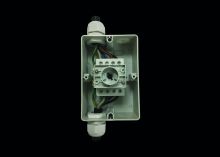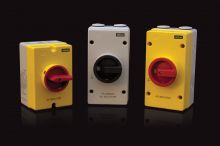
Isolating Electrical Installations
We all know electricity is dangerous – the European standard domestic AC voltage of 230V 50mA will stop the heart of a healthy adult, so we rely on the rigorous safety standards of devices sold in Europe being met, and look for the assurance of the CE mark* for all electrical equipment we buy, either as consumers or as trade professionals. When it comes to protecting humans working in the trade, common sense and adherence to the safe working practices laid down by government bodies and trade organisations is essential, and yet the Health & Safety Executive still receives reports of injuries and deaths every year at work due to electrical shock.
This article looks at isolation devices, a vital component of any installation to ensure the safety of anyone needing to shut down electrical equipment and contractors carrying out routine maintenance or repairs to installed electrical equipment. The major market for electrical isolation devices is industrial but other applications are likely to be found in commercial buildings, HVAC installations and for power supplies and security equipment. Particularly in an industrial setting, where there is a great deal of electrical machinery requiring inspection, cleaning, maintenance and troubleshooting, specific rules should be in place laying down under which circumstances electrical isolation is required and the procedures to be followed. At a minimum, the Health & Safety Executive states “…the isolator should be locked in position (for example by a padlock), and a sign should be used to indicate that maintenance work is in progress. Isolation requires use of devices that are specifically designed for this purpose; not devices such as key-lockable emergency stops or other types of switches that may be fitted to the machine. Any stored energy (hydraulic or pneumatic power, for instance) should also be dissipated before the work starts.”
When selecting an isolation device, adherence to relevant standards, robustness, quality, visibility, ease of installation and the right price point for the switches are all important. Devices must ensure that installations and equipment can be shut down quickly in the unlikely event of an emergency and that the electrical circuit is completely de-energised for routine service and maintenance.
An example of suitable devices for such applications, ROTARY ISOLATOR switches developed by UK manufacturer Hylec-APL, separate the circuit from the main power source and discharge any current trapped in the circuit, rendering the connected machine safe to work on, and of course ensuring fast shut down and the absence of any electrical current when an emergency stop is required. When used as an emergency stop, ROTARY ISOLATOR switches can be locked in the off position using a padlock. For safety, the switch is interlocked with the lid to prevent opening while in the “on” position. Manufactured from completely flame retardant polycarbonate, rated to UL94V-0, ROTARY ISOLATOR control switches provide an additional margin of safety with an excellent flame-resistance rating. Internally, the mechanism features silver-plated alloy contacts for high reliability.
ROTARY ISOLATOR control switches are a robust and well-designed range, suitable for the vast majority of commercial and particularly industrial situations. Available in both AC and DC versions, they are IP66/67 rated and completely prevent the ingress of dust and dirt, as well as being able to withstand powerful jets of water, vital in many factory and commercial applications where environmental dust and the need for machinery washdown are factors, such as the food and beverage industries.
Professional electrical contractors and installers require products which make their lives easier, and the ROTARY ISOLATOR range combines a compact footprint with generous internal dimensions, so there is space to manipulate cables during installation. Earth terminals are included, as well as captive retained cover screws. In the AC range, models are available from 20A to 80A, and in the DC range, 16A, 25A and 32A. ROTARY ISOLATOR switches are available from all good electrical distributors throughout the UK.
* The CE mark still applies after 29 March 2019 “for a limited period”. There will also be a UKCA mark introduced. For more information on this subject, see: https://www.gov.uk/guidance/placing-manufactured-goods-on-the-uk-market-if-theres-no-brexit-deal#new-approach-goods
Latest News
-
02/01/2025
BCL Enclosures joins Hylec -
27/09/2024
Hylec Showing at EDS 2024 We are exhibiting at EDS... -
30/01/2024
Exciting New Appointments for Hylec Hylec Kickstarts... -
11/01/2024
Hylec Go Kart Grand Prix The line-up for the first... -
01/12/2023
Hylec Closing dates for Christmas Hylec-APL will be closed from... -
01/02/2023
Hylec introduces new, improved Debox SL Hylec introduces the...
01933 234400



